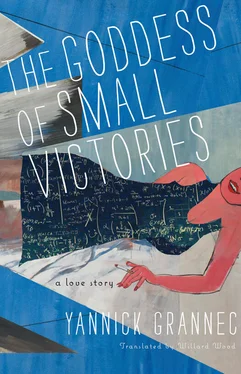Yannick Grannec
The Goddess of Small Victories
Kurt Gödel, Groucho Marx, and Werner Heisenberg are sitting in a bar.
Heisenberg: “It would be highly unlikely, but I wonder if we’re in a joke.”
Gödel: “If we were outside the joke, we would know, but since we’re inside the joke there’s no way of telling whether we are or not.”
To which Groucho answered: “Of course it’s a joke, but you’re not telling it right!”
To my father, by way of farewell. Y.G.
There are two ways of spreading light: to be the candle or the mirror that reflects it.
— Edith Wharton

Kurt Gödel, Institute for Advanced Study, 1956
(photo by Arnold Newman/Getty Images)
1. October 1980: Pine Run Retirement Home Doylestown, Pennsylvania
Anna waited at the exact boundary between the hallway and the bedroom while the nurse pleaded her case. The young woman concentrated on every sound, trying to contain her anxiety: wisps of conversation, raised voices, televisions droning, the swish of doors being opened, the clatter of metal carts.
Her back ached but still she kept her bag shouldered. She moved a step forward to be in the center of the linoleum square marking the room’s threshold. She fingered the index card in her pocket to give herself courage. Her well-reasoned argument was written out in block capitals.
The nurse patted the old woman’s age-speckled hand, straightened her cap, and adjusted her pillows.
“Now Mrs. Gödel, you don’t have so many visitors that you can go turning people away. Let her in. Have a little sport with her. It will give you some exercise!”
On her way out, the nurse gave Anna a small smile of commiseration. You have to know how to handle her. Good luck, sweetheart . That was all the help she could give. The young woman hesitated. Not that she hadn’t prepared for this interview: she would lay out the salient points of her case, articulating each word carefully and with enthusiasm. But under the steady, unwelcoming gaze of the room’s bedridden occupant, she changed her mind. Better to be neutral, to disappear behind the unobtrusive outfit she had selected that morning, a beige plaid skirt and matching twinset. She was certain that Mrs. Gödel was not one of those old ladies you call by their first names because they’re going to die soon. Anna’s index card would stay in her pocket.
“I’m honored to meet you, Mrs. Gödel. My name is Anna Roth.”
“Roth? Are you Jewish?”
Anna smiled at the thick Viennese accent, refusing to be intimidated.
“Is that important to you?”
“Not in the slightest. I like to know where people come from. I travel vicariously, now that …”
She tried to straighten up in bed and a painful grimace crossed her face. Impulsively, Anna reached out to help. An icy glare from Mrs. Gödel stopped her.
“So, you work for the Institute for Advanced Study? You’re terribly young to be moldering away in that retirement home for scientists. But enough. We both know what brings you here.”
“We’re in a position to make you an offer.”
“What total imbeciles! Money is not the issue!”
Anna felt a wave of panic. Whatever you do, don’t respond . She hardly dared draw breath, despite her mounting nausea from the smell of disinfectant and bad coffee. She had never liked old people and hospitals. The old lady poked under her cap and twirled a lock of hair but didn’t meet her eyes. “Go away, young lady. You don’t belong here.”
Back in the lobby, Anna collapsed onto a brown leatherette chair. She reached for the box of liqueur-filled chocolates on the nearby side table. She had left it there when she arrived, suddenly realizing that sweets might be a bad idea if Mrs. Gödel could no longer eat them. But now the box was empty. Anna bit down instead on her thumbnail. She had tried and failed. The Institute would have to wait until Gödel’s widow died and just pray to all the Rhine gods that she not destroy anything precious in the meantime. The young woman would so have liked to be the first to inventory Kurt Gödel’s papers, his Nachlass . She looked back with mortification at her feeble preparations. In the end, she’d been cast aside with a flick of the hand.
She carefully tore up her index card and distributed the pieces in the compartments of the chocolate box. She’d been warned about the Gödel widow’s stubborn vulgarity. No one had ever managed to reason with her, neither her friends nor even the director of the Institute. How could this madwoman cling as she did to this trove of cultural patrimony, which belonged, by right, to all mankind? Who did she think she was? Anna stood up. I couldn’t screw this up more if I tried, I’m going back .

She gave a perfunctory knock and went in. Mrs. Gödel seemed unsurprised at the intrusion.
“You’re not mercenary, and you’re not crazy,” said Anna. “All you really want is to provoke them! The power to hinder is all you have left.”
“And what about them? What are they cooking up this time? Throwing some kind of secretary at me? A nice girl but not too pretty so that my old lady’s sensibilities won’t be ruffled?”
“You realize perfectly the value of these archives to posterity.”
“Do you know? Posterity can go straight to hell! And those archives of yours, I just might burn them. I particularly want to use some of the letters from my mother-in-law for toilet paper.”
“You don’t have the right to destroy those documents!”
“And what do they think at the Institute? That the fat Austrian lady is unable to judge the importance of those papers? I lived with the man for more than fifty years. I know goddamn well how great a man he is! I carried his train and polished his crown all my life! You are just another of the prim, tight-sphinctered Princeton types wondering why a genius would marry a cow like me. Ask posterity for an answer! No one has ever wondered what I might have seen in him !”
“You’re angry, but your anger is not really directed at the Institute.”
The widow Gödel looked at Anna, her faded blue pupils and bloodshot eyes matching the pattern of her flowered nightgown.
“He’s dead, Mrs. Gödel. No one can help that.”
The old woman twisted her wedding band around her yellowed finger.
“Out of what drawer of doctoral candidates did they pluck you?”
“I have no particular degree in science. I’m an archivist at the IAS.”
“Kurt took all his notes in Gabelsberger, a shorthand used in Germany but now forgotten. If I gave you his papers, you wouldn’t know what to do with them!”
“I know Gabelsberger.”
The old woman’s hands stopped playing with her ring and gripped the collar of her bathrobe.
“How is that possible? There are maybe three people in the world …”
“ Meine Grossmutter war Deutsche. Sie hat mir die Schrift beigebracht .” My grandmother was German. She taught me how to write it.
“They always think they are so clever! I am going to trust you because you can spout a few words in German? For your information, Miss Librarian, I am Viennese, not German. And the three people who can read Gabelsberger don’t intersect with the ten people who can understand Kurt Gödel. Which neither you nor I are capable of doing.”
“I don’t claim to understand him. I’d like to make myself useful by inventorying the contents of the Nachlass so that others, who truly are qualified, can study it. This is not some airy fantasy, and it’s not a heist. It’s a mark of respect, Madam.”
Читать дальше














